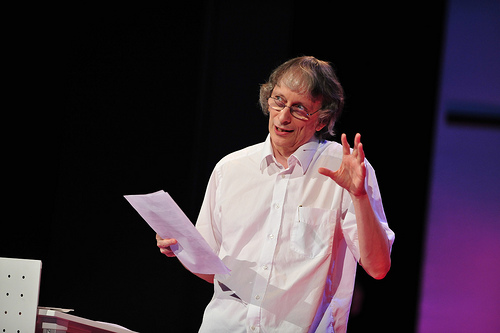
Unedited running notes from TEDGlobal 2009.
Our ancestors wondered what stars are. Humans have always yearned to know more — it is a survival instinct. “How can I be warmer, cooler, safer, in less pain?” Prehistoric cave artists may have wished to draw better. But although they wished for more knowledge, for progress, they failed. The world did not improve for a long, long, long time.
What makes stars shine? We only really knew why as recently as 1899. We made many important discoveries and advancements in the 40 years that followed, so why did we not discover this in the 100,000 years before? Our ancestors had brains of the same design as we have. But somehow they stagnated, while we have driven our knowledge and technology forward at a staggering pace. Deutsch asks, Why? What event revolutionized the human condition?
The scientific revolution is where we should start to look for answers. Ever since then, our knowledge of the physical world and how to adapt it to our wishes has grown. The revolution was based on the fact that “It is possible to know.” But what is that notion itself based on?
It was thought, in more primitive times, that “all that is important to know is already known.” People believed that ancient scrolls and dogma were all the truth we needed. But starting to actually make progress away from that is not as simple as just “rejecting authority.” Authorities have been rejected many times before, with no scientific progress resulting.
Promoting observation is important, but, as we learned today, perception does not offer a direct channel into “absolute reality.” It’s not like equations are carved into mountains. And if they are, it’s because we carved them there. (He says: “By the way, why don’t we DO that? What’s WRONG with us?”)
How do we know things? Empiricists would say: induction. How do we know spacetime is curved? “Looking at an eclipse, and seeing a dot here rather than there.” How do we know evolution is true? “Looking at rocks.” A creationist would say, “Ah! Gotcha! You’re using guesswork.” But they fail to see that their understanding of their ancient religious texts is also based on guesswork.
So is testability, as Karl Popper would say, the key to advancement? No. Even cranks can make theories that are “testable.”
What is the one thing that allows for scientific advancement, for progress, rather than stagnation? Deutsch’s answer comes from a Simpson’s clip. In the clip, Lucy Lawless, actress who played Xena in Xena: The Warrior Princess answers geeky fans’ questions about plotholes and inconsistencies with one answer: “If you see any plothole, remember that a wizard did it.” Deutsch says, interestingly, this type of explanation is not problematic because it contradicts a different explanation — it’s just about it being a bad explanation. In the clip, character Professor Frink asks for an explanation. Lucy Lawless offers a poor explanation. (Does it make sense to argue about what happened off stage in fiction?) The reason Lucy Lawless’ explanation doesn’t work, according to Deutsch, is because the “Wizard” entity that provided the explanation could easily be substituted for any other entity.
Easy variability is a sign of a bad explanation.
Look for explanations that can’t be easily varied, which still explain the phenomenon. In the case of our explanation of seasons, the tilt of the Earth’s rotation has many specific characteristics, any given one of which when challenged would affect everything about the theory. That’s why it is powerful. But if the activities of fickle gods were what the changing seasons where attributed to, any given detail could be changed about the gods — they created spring as a revenge! vs. spring returned as a sort of godly marriage blessing! — without actually affecting the end result.
Deutsch’s final conclusion: The truth consists of hard-to-vary assertions about reality.
Photo: David Deutsch at TEDGlobal 2009, Session 5: “Hidden algorithm” July 22, 2009, in Oxford, UK. Credit: TED / James Duncan Davidson
Comments (2)